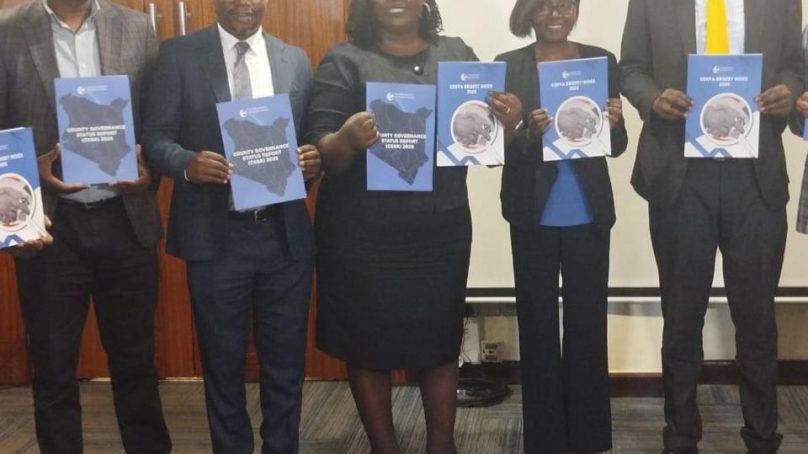
Kenya is grappling with a worsening corruption crisis, with bribery deeply embedded in the delivery of public services especially affecting the youth and the poor, according to two new reports released by Transparency International Kenya and supported by the Kenya National Commission on Human Rights (KNCHR).
Speaking during the launch of the 2025 Kenya Bribery Index (KBI) and the County Governance Status Report in Nairobi, Executive Director of Transparency International Kenya Sheila Masinde warned of a troubling regression in the fight against corruption.
Masinde noted that the country is witnessing a sharp integrity decline across many institutions that had shown signs of progress in 2019.
“The police service, now ranked as the most bribery-prone institution, has soared from a score of 64 in 2019 to 84 in 2025. This is not just a statistic, it reflects real lives,” she explained, stressing that Kenyans are being forced to pay bribes to access even the most basic public services.
Further, Masinde pointed out that the average size of bribes has also significantly increased across key public institutions.
“In the judiciary, the average bribe is Ksh8,800 followed by land services at Ksh12,610 and police at Ksh6,862. In an economy as strained as ours, this is a heavy burden for ordinary Kenyans,” she elaborated.
The TI Kenya Executive Director decried the culture of impunity in the police service, linking the high levels of bribery to systemic lack of accountability.
“If officers are not held responsible for police brutality including killings and serious injuries, why would they fear being caught taking a bribe? This becomes a small matter compared to the crimes they already get away with,” she implored.
Masinde further pointed out that the brunt of corruption is borne by young people, the self-employed, and the unemployed.
She explained that the age group most affected is between 18 and 44 who are trying to access justice, start businesses, register land, or obtain licenses yet face relentless demands for bribes thereby frustrating economic potential and erodes public trust.
Adding to the concern, Masinde divulged that 25 per cent of Kenyans surveyed said they don’t report corruption because they believe no action would be taken, while another 23 per cent feared retaliation, highlighting the urgent need for a whistle-blower protection law that remains pending.
Echoing these concerns, KNCHR Chief Executive Officer Bernard Mogesa observed that the findings pointed to a profound human rights crisis.
“When citizens, especially the vulnerable are forced to pay bribes for healthcare, identification or access to justice – that is not just corruption. That is a violation of their fundamental rights and dignity,” he reiterated.
Dr Mogesa stressed the disproportionately harsh impact on Kenya’s youth reporting that young people, who are already jobless and economically marginalised, were now being locked out of essential services because they could not afford to pay bribes.
“We must ask ourselves, how are we protecting them? How do we rebuild integrity in our public institutions?” questioned the CEO.
Consequently, Mogesa called for systemic reforms through technology, identifying one critical solution the country must prioritise as the digitisation of public services. He said removing human discretion in service delivery could reduce corruption significantly, adding that it was time to invest in digital infrastructure that guarantees fairness, transparency, and dignity for every Kenyan.
Meanwhile, both leaders called on the government to act on long-ignored recommendations, including those from past police reform task-forces, and to enact the long-pending Whistle-blower Protection Bill to restore public confidence and strengthen accountability.
The reports underscore a grim but urgent reality: unless systemic reforms are enforced, and corruption is treated not only as a governance failure but a violation of rights, Kenya’s development and democracy remained at risk.
- A Tell Media /KNA report / By Fride Amiani/Amina Bakari







